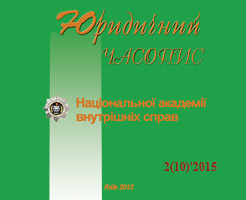Term «purpose» as Philosophical and Pragmatic Reference at Criminal Proceedings
Keywords:
purpose, task, criminal proceeding, evidence, investigating actions
Abstract
There are incorrectly used examples of «purpose» and «task» categories in the article based on the scientific analysis of certain norms of the Ukrainian Criminal Procedure Code. Also the methodological recommendations are formulated in order to prevent these discrepancies. The attention is drawn to the fact that some shortcomings are of methodological nature and also of partially technical and legal one. Although the attempts to define the purpose of some individual institutions and procedural actions at CPC are pretty clear, sometimes the meanings of «purpose» and «task» are equalized. Often the purpose of individual institutions and proceedings is not defined at all. Sometimes the Clause title declares about the purpose, but it is not defined as such. Sometimes the content of this definition clearly indicates that it is not about the purpose, but about the task. Sometimes the Clause title is not identifying the purpose, but it is determined in part 2, not in part 1 of the Clause. There are cases when the official definition of the purpose is controversial. So we justify the following conclusions: 1) the reason for errors in usage of these categories is that lately the investigation of this issue was not paid enough attention. These problems have not attracted the scientists’ attention lately. The previous research of this topic was handled inconsistently and contradictory by them; 2) the terms «purpose» and «task» should not be identified because the purpose is a mentally predictable and expected result of a specific activity and task is what you do to achieve it; 3) as «purpose» and «task» terms are always the elements of a certain system, which is the purposeful activity, their value is of a dialectical nature; 4) in order to correctly determine the «purpose» and «task» terms while implementing them at jurisdiction, the special requirements should be met. It is proved that today the purpose of criminal proceedings is not generally defined, and the purpose of some of its institutions and proceedings is not defined properly neither in legislation nor on the theoretical level. But they are hierarchically arranged though. Thus, the purpose of criminal proceeding is achieved by solving its tasks, which is formulated at Clause 2 of CPC. And this purpose achievement becomes a general means of purpose achievement of the whole jurisdiction. In turn, the realization of the justice purpose becomes a means of achieving a higher level purpose for the whole country and society itself, in particular the justice system.Downloads
Download data is not yet available.
Abstract views: 67 PDF Downloads: 32
How to Cite
[1]
Kotiuk, I. and Kotiuk, O. 1. Term «purpose» as Philosophical and Pragmatic Reference at Criminal Proceedings. Law Magazine of the National Academy of Internal Affairs. 10, 2 (1), 160-169.
Issue
Section
Law enforcement activities
Copyright (c) 2017 Law Magazine of the National Academy of Internal Affairs

This work is licensed under a Creative Commons Attribution-NonCommercial-NoDerivatives 4.0 International License.
- Authors reserve the right to authorship of their own work and transfer to the magazine the right of the first publication of this work under the terms of the Creative Commons Attribution License, which allows other persons to freely distribute published work with mandatory reference to authors of the original work and the first publication of an article in this magazine.
- Authors have the right to enter into separate additional agreements on non-exclusive dissemination of the work in the form in which it was published in the journal (for example, to post an article in the institution's repository or to publish as part of a monograph), provided that the link to the first publication of the work in this journal is maintained.
- The journal's policy allows and encourages the posting of articles by authors on the Internet (for example, in electronic storehouses of institutions or on personal websites), both before the submission of this manuscript to the editorial office and during its editorial processing, as this contributes to the creation of a productive scientific discussion and positively affects the efficiency and dynamics of citing the published work.




